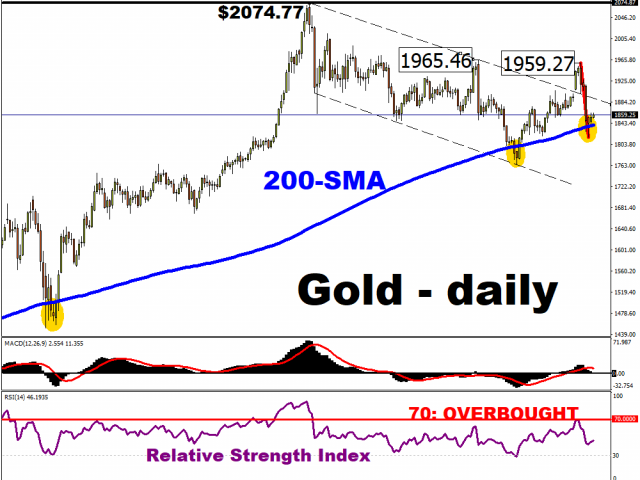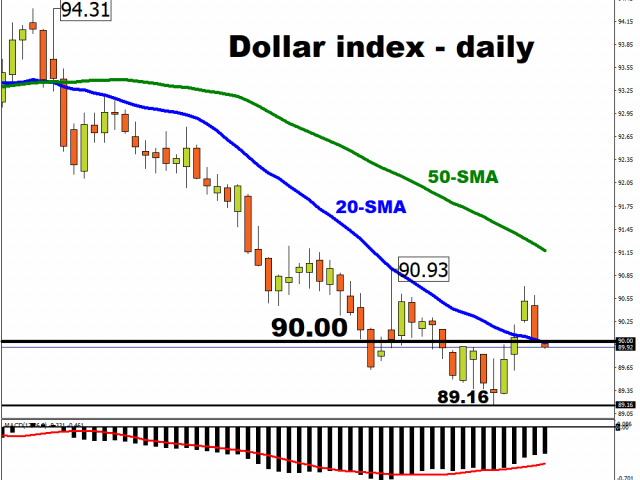By Han Tan, Market Analyst, ForexTime
Gold prices are enjoying some relief, after falling by more than 7% from the two-month high of around $1960 that it posted last week. On a week-to-date basis, spot Gold is eking out a 0.6 percent advance at the time of writing. The slight recovery has pared Gold’s year-to-date losses to less than 2%.
From a technical perspective, Bullion’s 200-day simple moving average (SMA) has been called into action once more, playing its role as a key support level. Gold bulls can take comfort from the fact that, since the end of 2018, prices have been trading consistently above its 200-SMA, and the two dips below that line over the past 12 months have been short-lived.
In other words, Gold’s uptrend that extends back to 2018 remains intact, with the 200-SMA having been a reliable support level.

Also note that the pullback which began last week could be deemed a healthy move from a technical perspective, considering that Gold’s 14-day relative strength index had reached overbought status by hitting the 70 mark.
With much of the froth now seemingly cleared, the precious metal may now make a more rational move higher.
Still, spot prices may have to clear that November high of $1965.46 to embolden Gold bulls further.
How is Gold affected by the Dollar and Treasury Yields?
Note that Gold has an inverse relationship with the Dollar, given that the precious metal is priced in USD. In simpler terms, when the Dollar goes down, Gold prices tend to go up, and vice versa.
Also note that Gold is a zero-yielding asset.
When the yields on US Treasuries climb, they make such investments more attractive relative to the zero-yielding Bullion. This could result in a rotation away from Gold to Treasuries, with the latter widely deemed to be a risk-free investment.
With such a context in mind, the recent pullback in Gold prices was the result of a Dollar rebound amid surging Treasury yields.
The 10-year Treasury yields strained towards the psychologically-important 1.20 percent level, after surging 30 percent between the past two Tuesdays (5 – 12 January), reaching its highest levels since March in the process. Since then, the 10-year yields have retreated by about 6.4 percent, while the Dollar index has moderated back below the 90 mark, offering some respite for Gold.
What is the outlook for Gold?
There appears to be enough reasons to remain bullish on Gold, and they revolve around US inflation.
- Markets are expecting US inflation to overshoot, with the Federal Reserve stating it will tolerate as such. Considering Gold’s traditional role as a hedge against faster inflation, that should ensure Gold remains well-bid in the lead up to such economic conditions.
- Real yields for US Treasuries (which take into account expectations for inflation) are in negative territory, which suggests that the yields that investors are expecting to get from US Treasuries aren’t going to overcome the forecasted inflation rate. This should ensure that Gold can maintain its allure as an inflation-beater.
- There is also a consensus that we could see more Dollar weakness over the coming months, despite rising US yields recently challenging such a narrative. A weaker Dollar should make it easier for Gold prices to explore its upside.
Things to look out for this week:
- The December US inflation data is due out later Wednesday. A higher-than-expected print may fuel tailwinds in Gold prices.
- Watch Fed chair Jerome Powell’s speech on Thursday. Recently, there has been some contrast among Fed officials’ views on when to pare back the central bank’s asset purchasing programme (a way to support the economy and financial conditions). The mere suggestion that the Fed could ease up on those asset purchases sometime this year has spurred Treasury yields higher. Then on Tuesday, St. Louis Fed President James Bullard and Boston Fed President Eric Rosengren poured cold water on the idea, prompting Treasury yields to pare down recent gains. Watch for more potential cues out of Powell.
- Also on Thursday, President-elect Joe Biden is set to unveil his plans for more US fiscal stimulus which he claims would be in the “trillions”. Such swathes of incoming financial aid for the US economy could spur inflationary pressures higher. Should Gold bulls be delighted by what they hear, don’t be surprised to see Gold prices charging upwards.
Disclaimer: The content in this article comprises personal opinions and should not be construed as containing personal and/or other investment advice and/or an offer of and/or solicitation for any transactions in financial instruments and/or a guarantee and/or prediction of future performance. ForexTime (FXTM), its affiliates, agents, directors, officers or employees do not guarantee the accuracy, validity, timeliness or completeness, of any information or data made available and assume no liability as to any loss arising from any investment based on the same.
 Article by ForexTime
Article by ForexTime
ForexTime Ltd (FXTM) is an award winning international online forex broker regulated by CySEC 185/12 www.forextime.com

